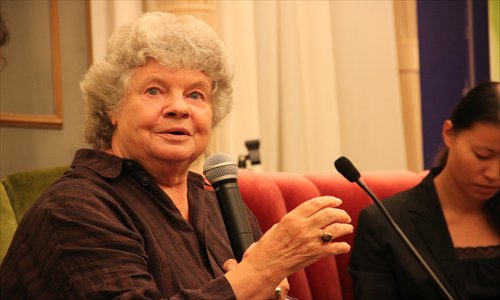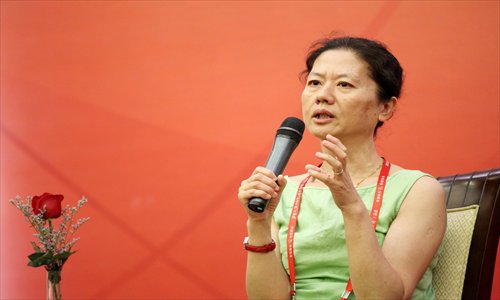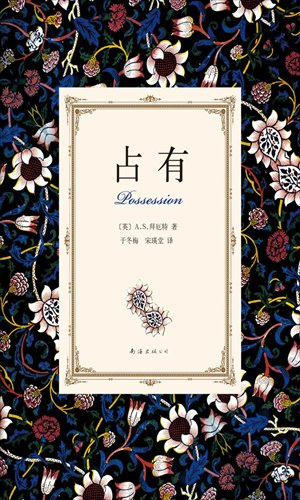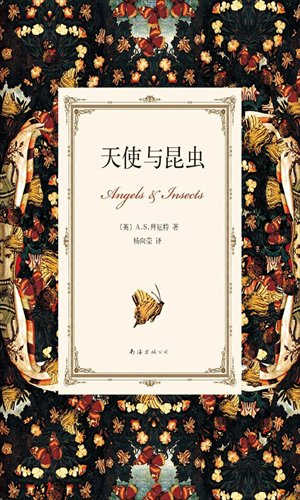The second sex
In the Chinese publishing industry there is a saying that if you win over the female readership, you have won the book market. This belief is borne out by facts. According to Li Yao, chief editor of the foreign literature department at Thinkingdom House in Beijing, of all Chinese readers of literature only 20 percent are male.

High esteem
It's not just women readers who are shaping the publishing industry in China today - it is also, increasingly, women writers. In recent years the works of Victoria Hislop's The Island, Zadie Smith's White Teeth, Doris Lessing's The Summer Before the Dark, María Dueñas' The Time Between Seams and Alice Munro's Runaway have all been translated and enjoyed huge commercial success in China. And homegrown writers such as Annie Baobei, Liuliu, Wang Anyi, Chi Li, Eileen Chang and Echo Chan, are held in as high esteem as their Chinese male counterparts.
Two of these lauded novelists, British writer and Booker Prize winner A.S. Byatt, and the Chinese writer Wang Anyi (The Song of Everlasting Sorrow), who was nominated for the Man Booker International Prize last year, held a forum in Shanghai recently to discuss the current state of women and feminism in literature. The Global Times has picked some highlights of the Q and A session.

Some countries have set up literature prizes exclusively for women writers such as the Orange Prize in the UK. What's your opinion about this?
Byatt: My view is that if you want to be a really good woman writer, you must be a really good writer, and you must not just talk to women about women. Before there was a women's movement in France and America, before there were women's studies in universities in Britain and in other places, women writers were better than male writers. But after academic research about women's writing, we've now got definitions of what women should write which is, on the whole, writing about other women.
Why I oppose the Orange Prize is that it is technically illegal. In the UK you are not allowed to discriminate against people on the grounds of gender or race. This prize does discriminate on the grounds of gender.
Wang: There is such a prize for women writers in China, but I don't think it's very well-known. And in China, people are not that sensitive to the whole idea of sexual discrimination, and for that reason not many people here are opposed to this prize. I was annoyed when I was called a feminist writer in the beginning, but now I tend to accept such a title because I do think there are differences between male and female writers.
It does not mean that women writers are weaker than men writers; women writers play an irreplaceable role in society. For example, I think women writers have richer emotions than male writers, and I think women are suited to writing literature because they are good at focusing on details and inner feelings. Men always want to create something grand, like an epic.
Byatt: Any writer can write any book, we can't distinguish books by the author's sexuality. There are male writers who also write about feelings.

Byatt once said that it's unusual for women to write intellectual novels, and it is extremely difficult for them to win acclaim if they do write such works. How do you deal with writing about profound matters such as historical events or scientific knowledge, for example?
Byatt: I'm interested in knowing things. There's a kind of suspicion that if writers do too much research and which involves too much knowledge, it will kill their novel. But it doesn't. Research has life, it has colors, it has facts, it has scientific images, and it will just make your novel more interesting.
Wang Anyi: There is a saying from ancient China that "ignorance is a virtue in a woman," but fortunately women today are free to learn. Actually, when I was working on my latest novel Tianxiang, I spent a lot of time learning new things. A big difference between Byatt and me is that I didn't receive a good education when I was young because of the Cultural Revolution (1966-76). If I have had studied at university, it would have been easier for me to write this book.

How do you evaluate the current work of women writers in your respective countries?
Byatt: I think that there was wonderful female writing until the 1970s. And then there was a period when women did try to write books for women. But then again we have a variety of women writers. We have Doris Lessing who writes good political novels, good novels about sex and good science-fiction novels. And we had Iris Murdoch who writes philosophical fables. And this is a very good thing.
Wang Anyi: Writers need a quiet environment to concentrate on their writing, but today they seem to be constantly disturbed by all kinds of publicity activities for their books. They are expected to turn up at every book fair going.
And the situation is worse for women writers, because the market wants beautiful faces to accompany their stories. And increasingly writers are just seen as another source of gossip in the media.